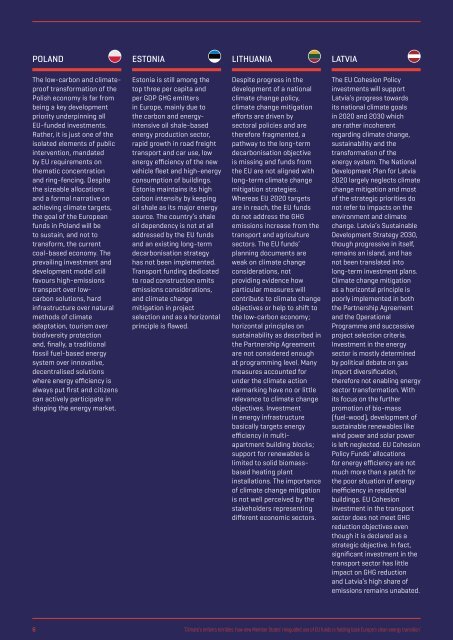ENFANTS TERRIBLES
enfants-terribles
enfants-terribles
You also want an ePaper? Increase the reach of your titles
YUMPU automatically turns print PDFs into web optimized ePapers that Google loves.
POLAND<br />
ESTONIA<br />
LITHUANIA<br />
LATVIA<br />
The low-carbon and climateproof<br />
transformation of the<br />
Polish economy is far from<br />
being a key development<br />
priority underpinning all<br />
EU-funded investments.<br />
Rather, it is just one of the<br />
isolated elements of public<br />
intervention, mandated<br />
by EU requirements on<br />
thematic concentration<br />
and ring-fencing. Despite<br />
the sizeable allocations<br />
and a formal narrative on<br />
achieving climate targets,<br />
the goal of the European<br />
funds in Poland will be<br />
to sustain, and not to<br />
transform, the current<br />
coal-based economy. The<br />
prevailing investment and<br />
development model still<br />
favours high-emissions<br />
transport over lowcarbon<br />
solutions, hard<br />
infrastructure over natural<br />
methods of climate<br />
adaptation, tourism over<br />
biodiversity protection<br />
and, finally, a traditional<br />
fossil fuel-based energy<br />
system over innovative,<br />
decentralised solutions<br />
where energy efficiency is<br />
always put first and citizens<br />
can actively participate in<br />
shaping the energy market.<br />
Estonia is still among the<br />
top three per capita and<br />
per GDP GHG emitters<br />
in Europe, mainly due to<br />
the carbon and energyintensive<br />
oil shale-based<br />
energy production sector,<br />
rapid growth in road freight<br />
transport and car use, low<br />
energy efficiency of the new<br />
vehicle fleet and high-energy<br />
consumption of buildings.<br />
Estonia maintains its high<br />
carbon intensity by keeping<br />
oil shale as its major energy<br />
source. The country’s shale<br />
oil dependency is not at all<br />
addressed by the EU funds<br />
and an existing long-term<br />
decarbonisation strategy<br />
has not been implemented.<br />
Transport funding dedicated<br />
to road construction omits<br />
emissions considerations,<br />
and climate change<br />
mitigation in project<br />
selection and as a horizontal<br />
principle is flawed.<br />
Despite progress in the<br />
development of a national<br />
climate change policy,<br />
climate change mitigation<br />
efforts are driven by<br />
sectoral policies and are<br />
therefore fragmented, a<br />
pathway to the long-term<br />
decarbonisation objective<br />
is missing and funds from<br />
the EU are not aligned with<br />
long-term climate change<br />
mitigation strategies.<br />
Whereas EU 2020 targets<br />
are in reach, the EU funds<br />
do not address the GHG<br />
emissions increase from the<br />
transport and agriculture<br />
sectors. The EU funds’<br />
planning documents are<br />
weak on climate change<br />
considerations, not<br />
providing evidence how<br />
particular measures will<br />
contribute to climate change<br />
objectives or help to shift to<br />
the low-carbon economy;<br />
horizontal principles on<br />
sustainability as described in<br />
the Partnership Agreement<br />
are not considered enough<br />
at programming level. Many<br />
measures accounted for<br />
under the climate action<br />
earmarking have no or little<br />
relevance to climate change<br />
objectives. Investment<br />
in energy infrastructure<br />
basically targets energy<br />
efficiency in multiapartment<br />
building blocks;<br />
support for renewables is<br />
limited to solid biomassbased<br />
heating plant<br />
installations. The importance<br />
of climate change mitigation<br />
is not well perceived by the<br />
stakeholders representing<br />
different economic sectors.<br />
The EU Cohesion Policy<br />
investments will support<br />
Latvia’s progress towards<br />
its national climate goals<br />
in 2020 and 2030 which<br />
are rather incoherent<br />
regarding climate change,<br />
sustainability and the<br />
transformation of the<br />
energy system. The National<br />
Development Plan for Latvia<br />
2020 largely neglects climate<br />
change mitigation and most<br />
of the strategic priorities do<br />
not refer to impacts on the<br />
environment and climate<br />
change. Latvia‘s Sustainable<br />
Development Strategy 2030,<br />
though progressive in itself,<br />
remains an island, and has<br />
not been translated into<br />
long-term investment plans.<br />
Climate change mitigation<br />
as a horizontal principle is<br />
poorly implemented in both<br />
the Partnership Agreement<br />
and the Operational<br />
Programme and successive<br />
project selection criteria.<br />
Investment in the energy<br />
sector is mostly determined<br />
by political debate on gas<br />
import diversification,<br />
therefore not enabling energy<br />
sector transformation. With<br />
its focus on the further<br />
promotion of bio-mass<br />
(fuel-wood), development of<br />
sustainable renewables like<br />
wind power and solar power<br />
is left neglected. EU Cohesion<br />
Policy Funds‘ allocations<br />
for energy efficiency are not<br />
much more than a patch for<br />
the poor situation of energy<br />
inefficiency in residential<br />
buildings. EU Cohesion<br />
investment in the transport<br />
sector does not meet GHG<br />
reduction objectives even<br />
though it is declared as a<br />
strategic objective. In fact,<br />
significant investment in the<br />
transport sector has little<br />
impact on GHG reduction<br />
and Latvia’s high share of<br />
emissions remains unabated.<br />
6<br />
‘Climate’s enfants terribles: how new Member States’ misguided use of EU funds is holding back Europe’s clean energy transition’


